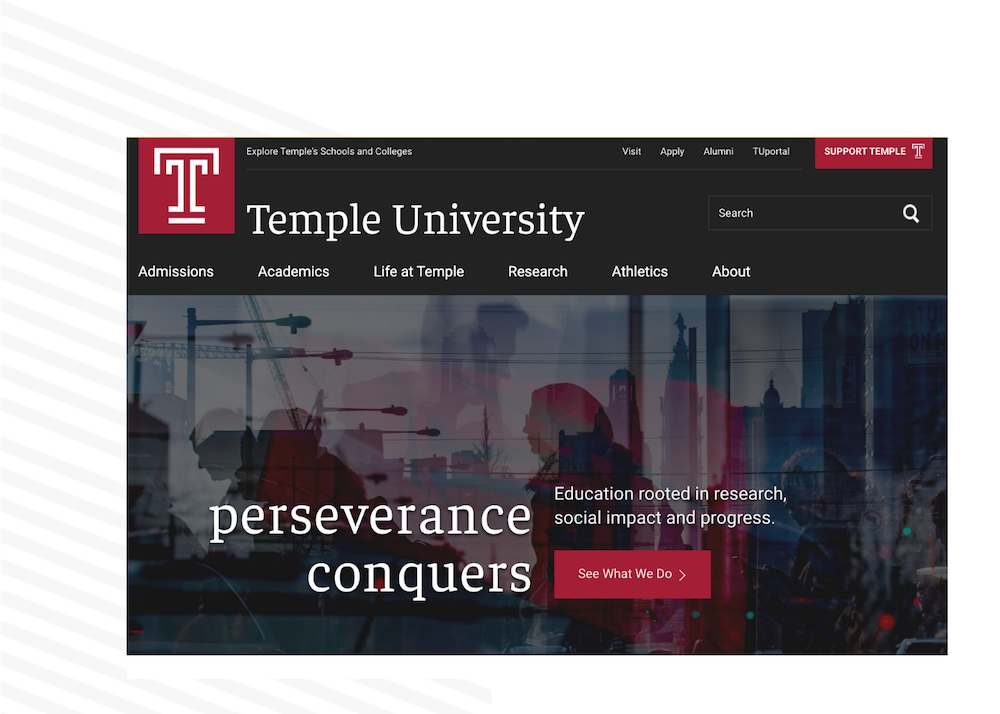Centralizing non-credit and continuing education programs to increase efficiency and improve student experience
About Temple University
Temple University offers over 100 non-credit and continuing education programs catering to more than 43,000 students each year. With a high annual growth rate and a wide diversity of program offerings—from intensive English language programs to corporate training options—Temple University is considered a leader in the field of continuing education and professional development.

Increasing internal efficiency and fostering a more consistent experience for learners was a high priority for Temple University’s continuing education and non-credit leaders. Their numerous programs and courses are managed by more than 50 distinct non-credit offices, each with their own processes and their own way of managing learners. In order to achieve the internal efficiency and consistent customer experience that would match their reputation, Temple sought to consolidate how it manages its continuing education and non-credit offerings.
Temple needed a software platform that could support and accelerate the school’s rate of growth by centralizing operations and streamlining business processes, so they turned to Destiny One™, the student-centric software platform designed by Modern Campus. “We saw the opportunity to have a product that fit our wide range of programs and requirements, and one that gave our staff the tools to administer those programs with very little central overhead,” said Nicole Westrick, Associate Vice Provost at Temple University.
Temple University’s goal is to have every non-credit program live on Destiny One. In order to do so smoothly, Temple mapped out a progressive Destiny One implementation plan. Eight departments, including Temple’s Intensive English Language Program and the Office of Non-Credit and Continuing Education, deployed the software platform right away. Since then, almost 55 more departments have gone live with Destiny One and new ones are getting set up every day. Temple’s onboarding process is incredibly efficient—in fact it only takes seven weeks to get a full non-credit program up and running with Destiny One, and only three weeks for a single course or conference.
As a result of shifting to the centralized approach to managing non-credit programming within Destiny One, Temple has experienced signfiicant revenue and efficiency gains.
"In our first full year with the system, our revenue was $9.6 million. This year, we’re on target for over 30 percent growth and fully anticipate $12 million in revenue," Westrick said. "It makes sense because we’re helping people shift their focus from administrative work to the things that really matter: program development, marketing and curriculum."
How has Destiny One helped Temple University?
1. Centralized Operations
Before implementing Destiny One, it was difficult for both learners and staff to find the information they required. Each of Temple’s programs had its own distinctive website, many of which didn’t offer online registration and payment options to students. This meant that students had to sift through dozens of different websites to find a non-credit program they were interested in taking. In addition to de-centralized public-facing information, there was also no centralized repository for staff to track non-credit student and program information.
“By partnering with Destiny Solutions we now have that repository,” Westrick said. “Destiny One makes it easier and quicker to respond to student inquiries and to provide our students, faculty, and support staff with a consistent and structured access to the information they need across the institution.”
In our first full year with the system, our revenue was $9.6 million. This year, we're on target for over 30 percent growth.
Nicole WestrickAssociate Vice Provost, Temple University
Importantly, Destiny One improves institutional operations without minimizing departmental decision-making. The platform centralizes information and ensures that staff across the institution are consistently using the most efficient and effective business process for everything from how they interact with learners to how they manage offerings and much more. However, while that centralization improves the student experience and allows the school to benefit from economies of scale, it does not reduce the autonomy of individual divisions.
“We chose Destiny One because it allows non-credit programs the maximum amount of control in running their own programs on their own schedules and timelines while standardizing the business operations, such as taking online registrations and payments,” said Vicki Lewis McGarvey, Vice Provost for University College at Temple University. “Programs can spend less time on administration and more time on running their programs and developing new ones.”
2. Faster program development
Today’s learners are looking for cutting-edge classes that meet their constantly evolving needs. Destiny One has made it easier for Temple to meet their students’ expectations by reducing the time-to-market for new courses and programs.
Course creation and approval was a previously time-consuming and manual process. By leveraging Destiny One’s automated course creation workflow process, most of the manual work has been eliminated. Now, as a course is being created, the system automatically notifies each person involved in the approval process and alerts them to any outstanding tasks. Once approved by all stakeholders, Destiny One publishes the program online so staff can start promoting it and students can start enrolling right away.
“The impact to students was probably the overarching driving impetus for Destiny One,” Westrick said. “We can create continuing education programs and get them out there so that the schools and colleges can market them and reach their students.”
3. E-commerce best practices
Temple’s staff can now quickly create unique web pages for programs without needing to know how to code. These pages are branded with Temple’s unique look and feel, and they offer students a consistent and seamless web experience. Before implementing Destiny One, pages had to be built manually and, as a result, many program websites did not have any e-commerce capabilities and students had to register for courses using paper and pay course fees directly with school staff.

Now with Destiny One, students can browse through individual program pages, or they can use a centralized website that lets them search through all non-credit course and program offerings, which makes the course selection process much more efficient. Once a prospective learner has chosen a course they’re interested in, they can enroll (or apply) right away and pay securely online. If a course isn’t available right away, learners can also elect to have Temple notify them when the section opens up for enrollment.
We chose Destiny One because it will allow non-credit programs the maximum amount of control in running their own programs on their own schedules and timelines while standardizing the business.
Vicki Lewis McGarveyVice Provost for University College, Temple University
Destiny One allows Temple to function like any major online retailer, in that the website provides all the information and tools that a prospective buyer needs in order to manage the transaction themselves without help from staff. However, if learners do have questions or require assistance, they can simply request additional assistance and Destiny One will ensure that the request is routed to the appropriate staff member and that they have access to the full learner profile, including previous course and billing information and a full communication history. This means staff can answer questions from current and prospective learners quickly, accurately, and contextually.
4. Scalable conference management
In addition to courses, certificates, and full programs, Temple also hosts a number of conferences each year. However, staff found conference management to be both cumbersome and time consuming. Temple chose to also implement Destiny One’s Conference Manager, allowing staff to manage the entire conference process, from set up to marketing to registration and beyond.
The Destiny One Conference Manager allows institutions to scale and automate the entire process of setting up, marketing, and managing conferences. Staff simply input the conference details and are able to begin taking enrollments almost immediately.
“We were able to create a web presence in a matter of hours rather than the weeks or months that it might have taken for a web development team to build that whole registration and payment process,” Westrick said.
The impact of the Conference Manager, and of Destiny One more broadly, has increased recognition for the work and support of the continuing education division across Temple.
"We recently we had a unit host a conference attended by several hundred people and,
in the conference program, they acknowledged the continuing education system team
and one of our student workers who helped support and set up the conference using
the non-credit system," Westrick said. "The fact that a school or college recognizes
their systems people speaks volumes about the way that we’ve been able to build that
relationship and the impact the system itself has had."
The bottom line: Improved the experience for staff and students
Centralizing operations and automating the course and conference creation and enrollment processes have been major timesavers for staff. Rather than spending the bulk of their time on administrative duties, staff can now focus on developing and marketing programs and creating an engaging experience for learners. Across all facets of operations, Destiny One gives staff the tools they need to provide learners with a more intuitive and user-friendly customer experience.
“Destiny One has eliminated many lengthy manual processes, thereby making our staff more efficient and productive while providing integration points with our existing backend computing infrastructure,” Westrick said. “Despite its breadth, it’s a user-friendly platform and it allows us to enhance our relationships with students, faculty, and staff.”

Tackle your biggest challenges